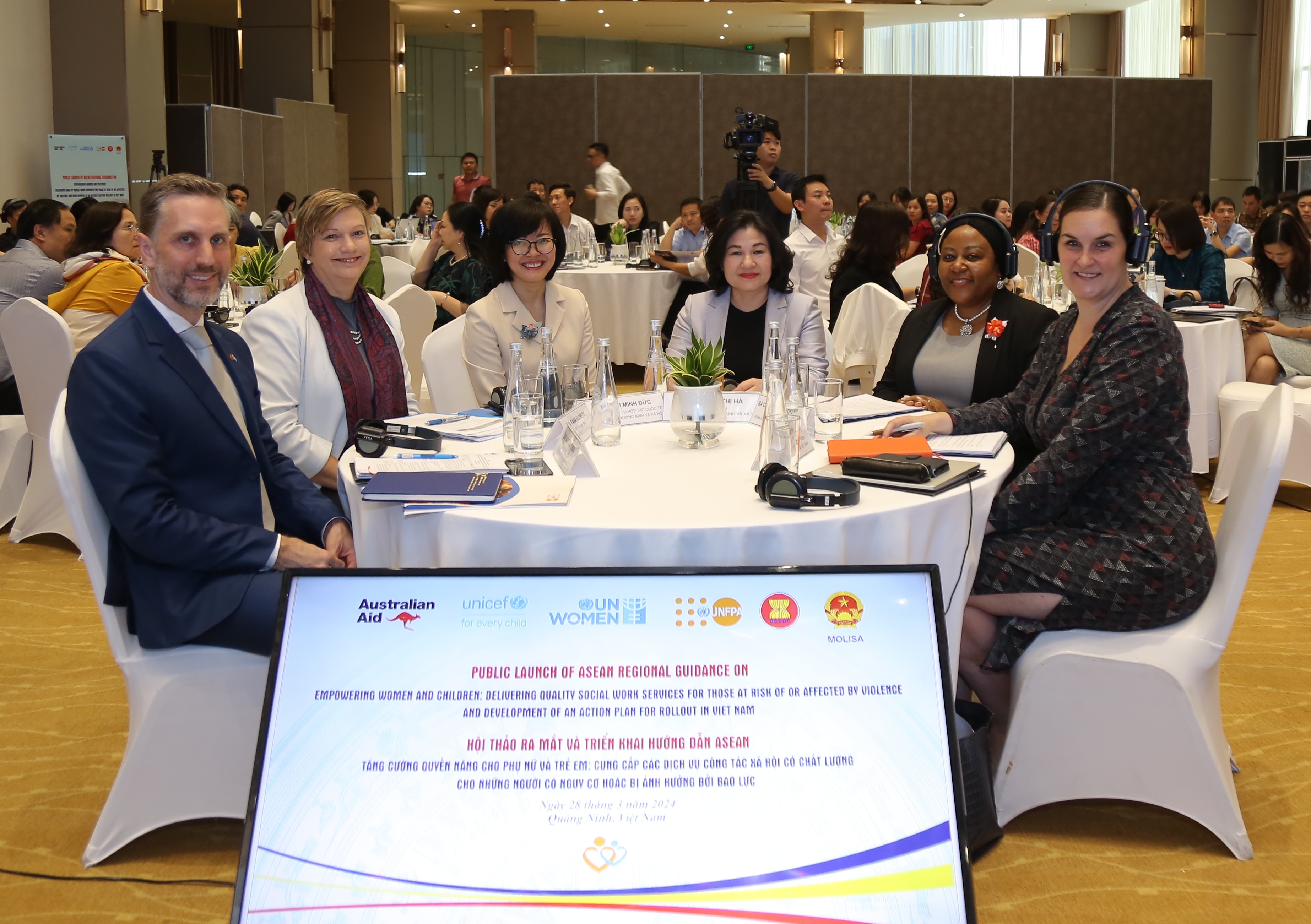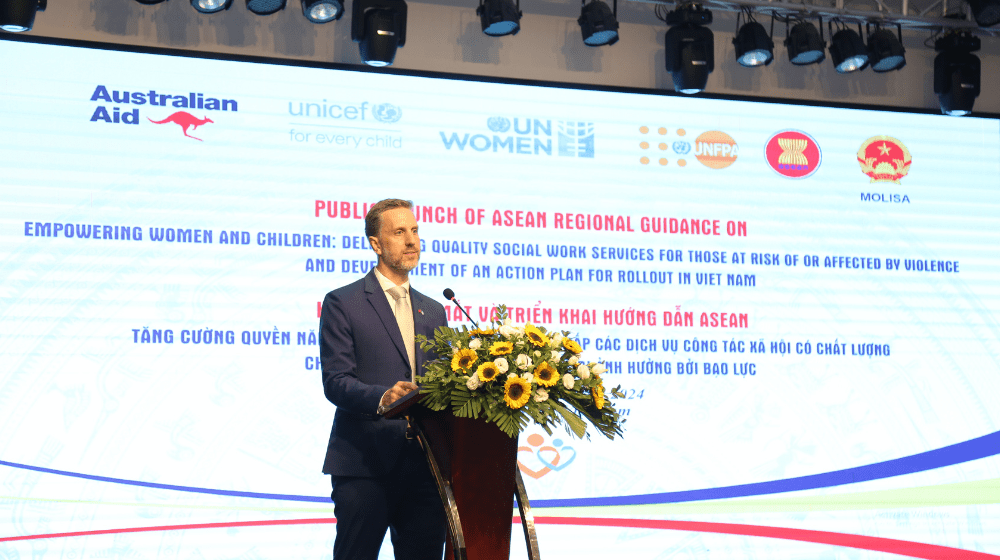- Excellency Mdm. Nguyen Thi Ha, the Vice Minister of Labour, Invalids and Social Affairs;
- Representatives from the Ministries of Health, Education and Training, and Culture, Sports and Tourism;
- Delegates from Viet Nam Farmers’ Union; Social Work Association, and universities in charge of training social work;
- Social workers from various provinces and cities across the country;
- Ms. Majdie Hordern, First Secretary, Development Cooperation, Australian Embassy Vietnam
- My colleagues from UNICEF, UN Women and UNFPA in the regional office and in Viet Nam;
- Representatives from the ASEAN Secretariat and ASEAN countries
- Local media;
Today, we are gathering here in the beautiful city of Ha Long, Quang Ninh to officially launch the ASEAN Guidance on “Empowering Women and Children: Delivering Quality Social Work Services for Those at Risk of or Affected by Violence” and to discuss the rollout and implementation of the Guidance among ASEAN Member States.
I recently met a retired teacher and survivor of domestic violence, let’s call her Mai, who shared her story with me at one of the UNFPA-supported One-Stop-Service Centres in Viet Nam. Mai endured pain for many years from a violent husband and felt blamed by others in her community. Yet with psychosocial support and advice from practitioners, Mai is now in a much better position: she feels independent, knowledgeable and confident about her future. And she wants other women to feel the same. Mai’s story is why we are all here today.
I have just returned from visiting the One-Stop Service Centre in Thanh Hoa as well as a feasibility study with MOLISA to the 3 provinces to hopefully replicate additional One Stop Service Centres, commonly known as Anh Duong House in the North and South of Viet Nam. The pilot model has successfully provided a wide range of services, meeting international standards including health care, counselling, social welfare services, emergency shelters, police protection, legal and justice services, and referrals. Importantly, this model centres the survivor and her needs. I heard about high demands for services and, as we all know, the majority of those experiencing GBV don’t speak out or seek support. This is a common challenge that UNFPA hears in every country. But here in Viet Nam, UNFPA in partnership with the Government of Viet Nam, the Government of Australia and the Korean International Cooperation Agency (KOICA) will provide technical and financial support to establish four more Anh Duong Houses.
Violence against women and children remains one of the most widespread human rights abuses in the world, despite efforts to end it. According to a UN Study on Violence Against Women in Asia and the Pacific, conducted in 2013, the rates of violence by men against a female partner, range between countries from 26% to 80%. And we know that women in marginalised and minoritised groups are more at risk: women with disabilities are at least one and a half times more likely to be physically and sexually abused than women without disabilities. Additionally, research by UNICEF estimates the prevalence of physical abuse among boys and girls in this region ranges from 10% to over 30%; sexual abuse up to 11%, and emotional abuse between 31% and 68%.
The findings of the UNFPA-supported National Study on Violence against Women in Vietnam in 2019 showed that nearly 2 out of 3 women have experienced at least one form of violence by their husband or intimate partners during their lifetime. Yet this violence remains largely hidden as over 90% of women never seek help from local service providers or the authorities.
Over the past decades, the Government of Viet Nam in collaboration with UN agencies, notably UNFPA, UNICEF and UN Women has made strides to address violence against women and children as well as to enhance support services to survivors. Viet Nam has joined the pilot of the “Essential Service Package for Women and Girls Subject to Violence” - a significant milestone. This comprehensive package consists of four modules, covering health, social services, policing and justice and multisectoral coordination. Social work plays a key role in supporting survivors of gender-based violence and in connecting with other services. The Package therefore underlies the principles and approaches that support high quality social work with respect to women and children exposed to violence. They include promotive, preventative and responsive social work approaches.
In efforts to improve its social work profession, Viet Nam has also endorsed a National Plan on the development of social work profession 2021 – 2030 and the National Programme on renovation and development of social assistance system by 2025. The aim is to increase the number of social workers and to ensure the provision of high - quality social services.

Today’s launch of the ASEAN regional guidance marks another important step in supporting Viet Nam as well as other ASEAN member States. I would like to appreciate Viet Nam’s leadership and social work strengthening across countries in ASEAN. MOLISA, Mdm Ha and Mme Duc championed the development of the guidance note in the region. UNFPA is delighted to have had the opportunity to lead the development of this guidance as well as finance the country level translations, in close partnership with UNICEF and UN Women. The guidance supports policymakers, managers, and members of the social service workforce and allied sectors in ASEAN member states to design and deliver quality social work services. It also serves as a reference point for developing legislation, policies and tools to deliver quality social work services.
I look forward to our discussion on the roll out and implementation of this Guidance as well as the hearing experiences and learning among ASEAN Member States. UNFPA, together with the UNICEF and UN Women, is committed to supporting you on this rollout and implementation. Everyone wherever they live has the right to live with dignity and free of violence, and through our joint efforts we can, like my story of Mai, make this a reality./.


